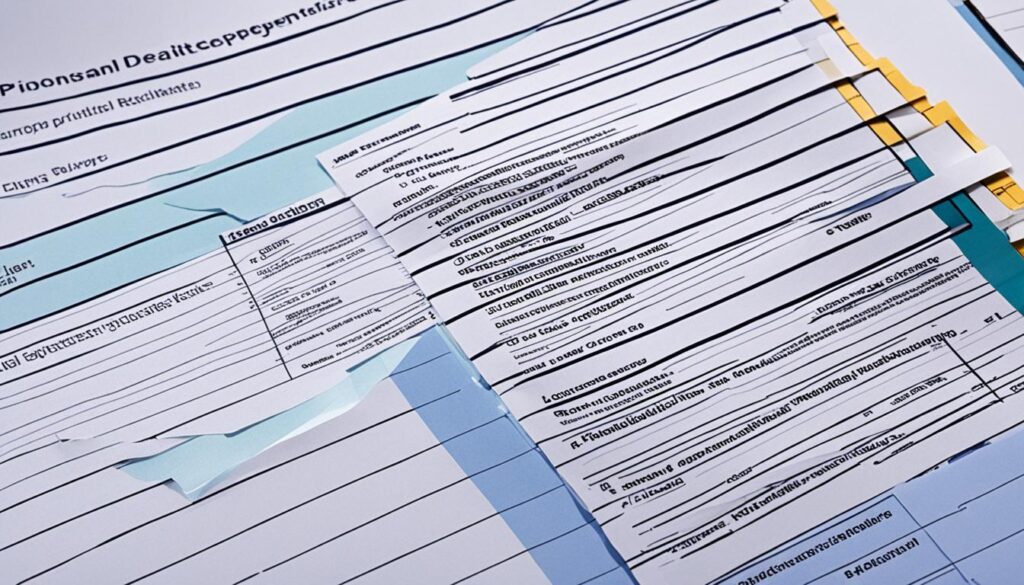Getting a loan can seem hard, but knowing what to do helps a lot. It’s not just about paperwork. You also need a good business plan and clear financial records. These things prove to lenders that you can handle money well. With these loan advice tips, you’ll handle the borrowing strategy better.
Understanding the Loan Application Process
Getting a loan might feel scary at first. But, if you learn about the loan application process, it gets easier. The process can take from two weeks to six months. This time varies based on how well the lender knows your industry, how quickly you respond, and if you provide all needed info.
- Application: You start by giving the needed documents and filling out forms to say you want a loan.
- Underwriting: Next, your financial info is closely checked. This verifies it’s correct and sees if you can pay back the loan. It’s also when lenders learn about your business and its future.
- Closing: If the loan is okayed, they send a letter with the loan details. Then, they prepare for the final signing after one last check.
In every step, knowing what the lender needs and when they decide is key. Working closely with a team helps. This makes sure every part of the loan is taken care of well.
Understanding that getting a loan needs careful planning and action is helpful. It makes you ready for each part. In the end, this can help you get your loan successfully.
Essential Financial Documentation for Loan Applications

Proper financial records are key to get a loan approved fast. They show lenders you manage money well. This makes your loan process smoother.
Here are the main documents you’ll need:
- Proof of Income: This could be pay stubs, tax returns, or bank statements. They prove you can pay back the loan.
- Business Financial Statements: For a business loan, you’ll need profit and loss statements and more. They show your business is doing well.
- Tax Returns: Personal and business tax returns give a full look at your income. They show you’re good with money.
These documents are very important. They make it easier for lenders to say yes. It also helps speed up getting your loan.
Getting these papers ready early can really help. It makes applying for a loan much easier.
Loan Application Tips for Quick Approval
Getting a loan fast means following some loan application tips. First, make sure all your documents match. If the details don’t line up, you might face delays or a no.
Being ready is key. Gather all your financial info early. This includes pay checks, tax forms, and company numbers. It shows the lender you’re serious and organized.
Don’t forget about online lenders, like Numida. They often work faster than traditional banks. Thanks to technology, they check your application quickly.
Finally, think about the loan type you need. Unsecured loans tend to move faster. They don’t need as much paperwork. But, your financial situation plays a big role in what’s best for you.
How to Choose the Right Lender
Choosing the right lender is very important. It affects your loan’s cost and your experience. Think about reputation, interest rates, terms, and service. This helps make borrowing smoother and gets you better terms.
Start by checking the lender’s reputation. Online reviews and trusted sources are good places to start. Happy customers mean a lender is reliable. Don’t just pick the first one you find. Compare at least three to save money.

Interest rates hugely affect your payments and total loan cost. Loan terms are critical too. For example, mortgages can be for 15 or 30 years. Each has pros and cons. Knowing your options can align your loan with your financial goals.
Getting preapproved is essential. It shows exactly what you can afford. This makes you strong when looking for loans. The lender must give you a loan estimate in three days. This shows all the terms clearly.
Looking at different lenders can uncover lender credits. These reduce the cash you need up front. The 28/36 rule helps keep your housing costs low. It shouldn’t be over 28 percent of your income.
- Reputation: Check online reviews and ratings, and seek recommendations.
- Interest Rates: Compare rates to find the most economical option.
- Loan Terms: Choose between 15-year and 30-year terms, based on your financial goals.
- Preapproval: Secure a preapproval to understand your borrowing power.
- Lender Credits: Look for credits that can lower your closing costs.
- 28/36 Rule: Keep housing costs within 28 percent of your gross monthly income.
To pick the best lender, keep looking and compare offers. This ensures you get competitive terms. These tips equip you to choose wisely, getting you a better deal.
Preparation: Checking and Improving Your Credit Score
Before you try for a loan, know why your credit score matters. It affects your loan process and the offers you get. To improve your credit score, first check your reports from Experian, Equifax, and TransUnion. It helps to find and fix any wrong info.
On-time payments are key for a good credit score because they’re a big part. Missing payments can harm your score for up to seven years. Set up auto payments or reminders to keep bills up to date.
To better your credit score, also watch your credit use. Try to lower your credit card balances. Keep your use under 30%. This shows you borrow wisely and boosts your score.
Opening new accounts can build credit. But, don’t ask for too much credit too fast. Too many checks on your credit can drop your score. Only apply for new credit if really needed.
Improving your credit score needs time but pays off. Late pays and bankruptcies disappear after seven to ten years. Keep accounts positive and avoid bad marks till then.
Credit repair firms often can’t do more than you. Use tools and good habits to improve your credit score yourself.
Last, for a FICO® score of 300 to 850, have an account open six months with recent use. Keep these tips in mind for a strong credit score and smooth loan process.
Strategies for a Compelling Loan Application
Making a great loan application really matters for getting approved. It’s very important when lots of people want loans. A good application is clear and detailed. It shows lenders your business is strong and reliable.
To make your loan application better, include a detailed business plan. This plan should have:
- Executive Summary
- Company Description
- Products and Services
- Market Analysis
- SWOT Analysis
- Marketing and Sales Strategy
- Financial Analysis
Lenders prefer businesses that have a clear plan for the loan. This plan should show how the loan will help in the long run. If you need tips for your business plan, check out small business loan tips.
It’s also key to have all your financial paperwork ready. Lenders often ask for things like your ID, tax ID, and financial statements. Having these documents ready makes your application stronger.
Think about offering collateral, like land or equipment, for the loan. This shows you’re serious and lowers the risk for lenders. This could get you better terms for your loan.
Know what the lender wants. Different lenders need different things. Sometimes, you might need to offer a personal guarantee. This means if you can’t pay the loan, your assets might be at risk. So, it’s smart to think about all parts of the loan process.
Understanding Different Types of Loans
When looking at types of loans, it’s key to know the differences. Each type fits your money needs and goals differently. There are a few main kinds that help you choose wisely.
Loans split into two big groups: conventional loans and government-backed loans. Private lenders give out conventional loans without federal insurance. Government-backed loans, like FHA, VA, and USDA, have perks. They need smaller down payments and are easier to get.
It’s also important to look at fixed interest rate loans and variable interest rate loans. Fixed interest rate loans keep the same rate, making budgeting easier. But variable interest rate loans change with the economy. They can save you money if rates fall but cost more if they go up.
Think about how long you want to pay back your loan, too. Short-term loans mean higher monthly payments but less interest over time. This saves you money. Longer-term loans, however, have smaller monthly payments. But, you end up paying more interest overall.
Knowing about these types of loans helps match one to your financial situation and goals. Picking the right kind, like a government-backed loan for lower upfront costs or a fixed rate for predictable payments, can change your borrowing journey.
Common Mistakes to Avoid During the Application Process
Getting a loan right means avoiding common mistakes. One big mistake is not completing the application. Lenders need a lot of details to decide. If anything is missing, like proof of income, there can be big delays or even a no.
Not looking at different lenders is another misstep. Every lender has its own rules and rates. If you don’t compare, you might miss out on a better deal. It’s key to look at everything a loan will cost you, not just the first price.
Many people forget to read the small print too. This part has important info that affects your loan and payback. Not knowing this can cause big problems later. Always read and understand your loan agreement fully before signing it. Doing so improves your chances of getting a good loan.






